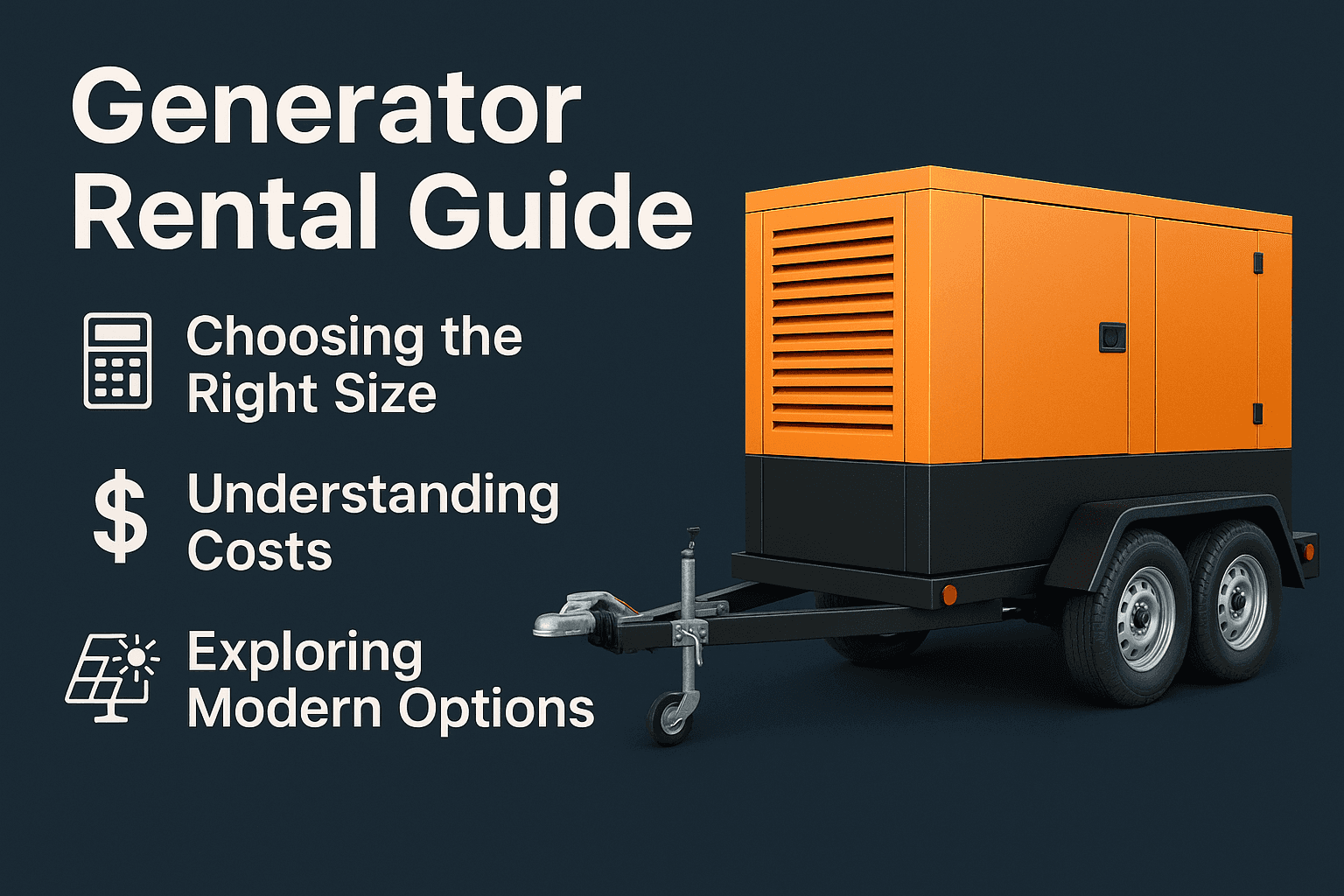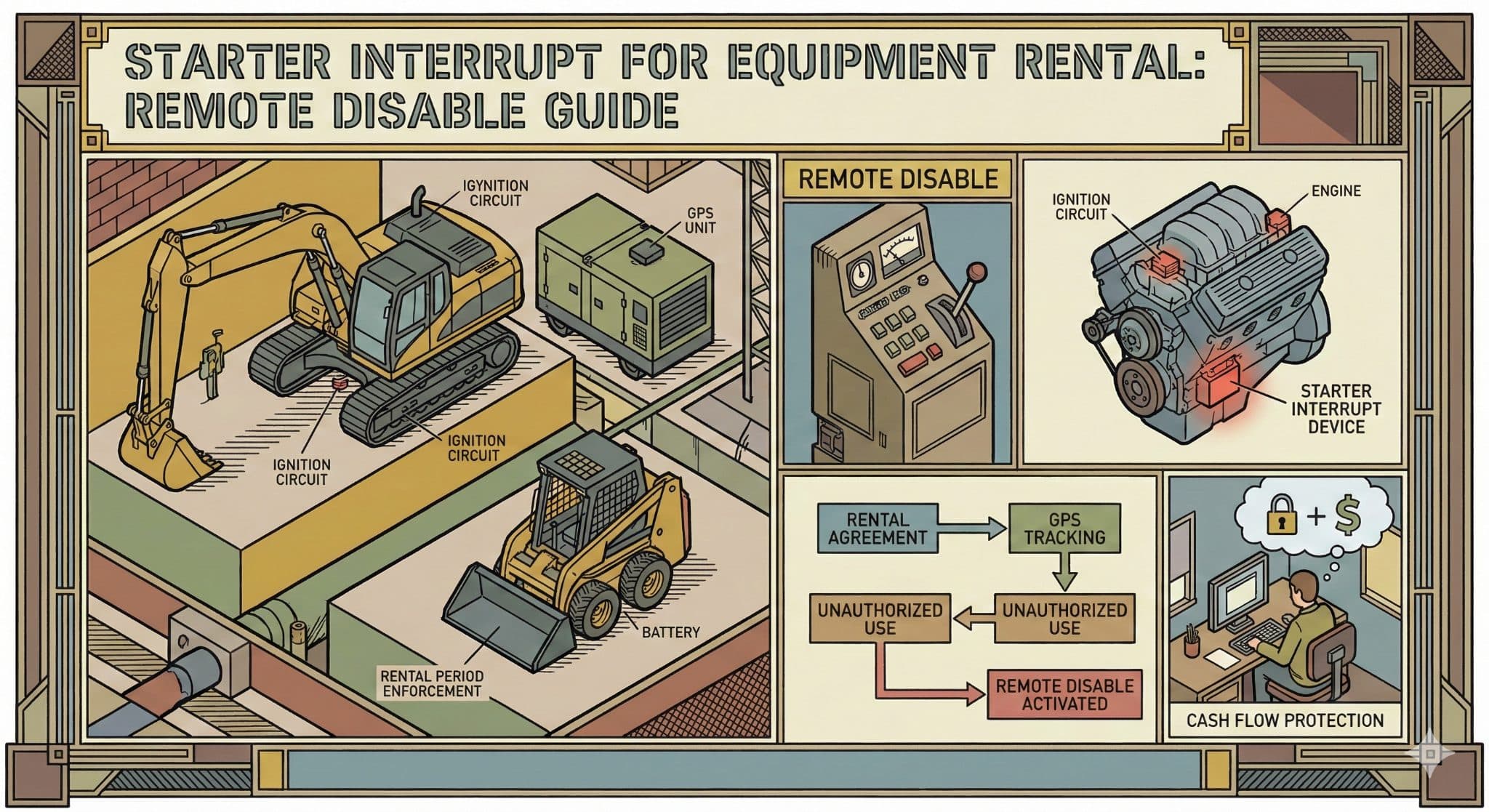Last updated: February 2026
Key Takeaways
- Calculate exact power requirements by listing appliances, accounting for startup surges, and adding a 10-20% safety margin
- Fuel costs typically run $0.30-$0.40 per kWh for diesel generators—proper sizing optimizes efficiency
- Solar hybrid generators dramatically reduce fuel costs and emissions for long-term or daytime applications
- Telematics-equipped generators provide proactive maintenance alerts and real-time optimization data
- Undersized generators risk equipment damage while oversized units waste money on unnecessary capacity
A Guide to Renting a Generator: How to Pick the Right Size, Manage Costs, and Explore Solar Options
Renting a generator is an effective way to access reliable, temporary power without the large upfront investment or the ongoing hassle of ownership. Generators can power construction sites, serve as emergency backups during outages, or support outdoor events, providing electricity precisely when and where it's needed.
However, many generator rental websites only list products without practical guidance. This comprehensive guide provides all the essential information you need: choosing the right generator size, understanding fuel consumption and costs, comparing diesel units to solar hybrid generators, and maximizing uptime using telematics.
Why Renting a Generator Makes Sense
Generator rentals offer significant financial and logistical advantages. Maintenance and servicing are typically managed by the rental provider, ensuring the generator is always ready to use. Renting also frees you from the burden of long-term storage and ongoing maintenance, ideal for short-term or intermittent needs.
Choosing the Right Generator Size
Selecting the correct generator size is crucial. An undersized generator risks overload and equipment damage, while an oversized unit leads to unnecessary expenses and inefficient fuel consumption. Here's how to accurately determine your generator size:
- List Your Power Requirements:
- Identify each appliance or tool requiring power (lights, refrigerators, HVAC units, construction equipment).
- Check labels or user manuals for the running wattage requirements.
- Consider Startup Surges:
- Certain appliances, like refrigerators and air conditioners, require additional power at startup.
- Calculate the highest startup surge and add this to your total running wattage.
- Include a Safety Margin:
- Always select a generator with 10-20% more capacity than calculated to handle unexpected loads safely.
Example:
- Lights: 450 watts total
- Refrigerator: 700 watts running, 2200 watts surge
- Furnace blower: 800 watts running, 2350 watts surge
- TV: 100 watts running
Total running watts: 2050W; Largest surge: +1550W (furnace blower) = approximately 3600W. Choose a 4-5 kW generator for comfortable, reliable operation.
See How Hapn Works for Your Fleet
Get a personalized walkthrough and transparent pricing — no commitment required.
Get Pricing →Understanding Fuel Consumption & Managing Costs
Fuel expenses can significantly impact generator costs. Typical diesel generators consume about 0.1 gallons per kWh, translating to approximately $0.30–$0.40 per kWh, significantly higher than grid electricity. Properly sizing your generator to operate between 50-80% capacity will optimize fuel efficiency and minimize waste.
Be aware that larger generators consume more fuel, even at lower loads, resulting in unnecessary expenses. Matching your generator closely to your needs will ensure cost efficiency. For more detailed analysis of operational expenses, explore total cost of ownership for equipment rental.
Diesel vs. Solar Hybrid Generators
While diesel generators are the traditional reliable choice, modern solar hybrid systems provide compelling benefits:
- Cost Savings: Solar hybrids dramatically reduce fuel costs by utilizing solar energy.
- Efficiency and Emissions: Hybrids operate quietly, produce fewer emissions, and only use fuel when necessary, greatly reducing environmental impact.
- Reliability: Diesel remains preferable for critical 24/7 operations, while hybrids are ideal for long-term or daytime applications due to their efficiency and quiet operation.
If environmental sustainability, noise reduction, and long-term cost savings matter, solar hybrids are worth exploring. Understanding fleet utilization benchmarks helps you determine if hybrid systems align with your operational patterns.
Enhancing Generator Uptime with Telematics
Telematics technology significantly boosts reliability and performance. Remote monitoring capabilities enable rental providers to track vital metrics such as fuel levels, generator load, and overall health, addressing issues proactively to avoid downtime. Key benefits include:
- Proactive Maintenance: Instant alerts for potential issues, enabling prompt intervention before significant problems develop.
- Optimized Usage: Real-time data helps identify whether your generator is undersized or oversized, allowing adjustments that improve efficiency and prevent issues.
- Reduced Downtime: Immediate alerts and rapid response reduce disruption, ensuring continuous, reliable operation.
For mission-critical power needs, telematics-equipped generators are highly recommended. Learn how GPS tracking improves equipment management across your fleet.
Key Takeaways for Generator Rentals
- Accurately calculate your power requirements by considering running wattage, startup surges, and adding a safety margin.
- Plan fuel consumption carefully to manage operating costs effectively.
- Evaluate modern solar hybrid systems for significant long-term fuel and emissions reductions.
- Leverage telematics technology to enhance reliability and efficiency, ensuring consistent operation.
By following these guidelines, you'll confidently rent a generator suited to your precise needs, ensuring reliable, cost-effective power whenever and wherever you need it.
Written by the Hapn Team — Hapn provides full-stack fleet and asset telematics for construction, rental, and field service companies. Learn more →
Frequently Asked Questions
What size generator do I need for my job?
Calculate total running wattage of all appliances, add the highest startup surge, then multiply by 1.1-1.2 for a safety margin. If your total is 3600W, rent a 4-5 kW generator to ensure reliable operation under load.
How much will generator fuel cost me?
Diesel generators cost approximately $0.30-$0.40 per kWh of generation. A 20 kW generator running 8 hours daily at $0.35/kWh costs roughly $56/day in fuel—proper sizing and solar hybrids can significantly reduce this.
Are solar hybrid generators worth the extra cost?
Yes, if you have consistent daytime operations or long-term rental periods. Solar hybrids reduce fuel consumption by 40-60% in favorable conditions, pay for themselves quickly, and reduce noise and emissions significantly.
What does generator telematics actually do?
Telematics monitors fuel levels, load percentage, engine hours, and health metrics in real-time. Rental providers can proactively schedule maintenance, alert you to issues before failure, and provide usage data to optimize your generator sizing.
Can I rent a smaller generator and upgrade if needed?
Short-term upgrades are possible but costly—you'll pay multiple rental fees and switching fees. It's better to size correctly from the start. Contact your rental company to discuss your needs; they can recommend the right capacity.
Ready to Take Control of Your Fleet?
Join hundreds of construction and rental companies tracking smarter with Hapn.
Get Your Custom Quote →

